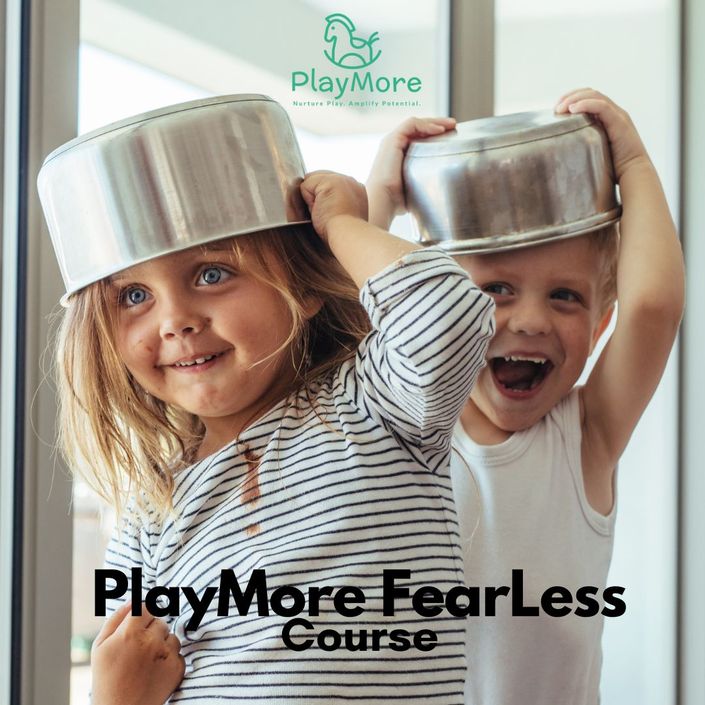Get access to the Making Sense of It course, our closed community group and free quarterly live Q & A's when YOU need support with varying sensory needs and preferences in your context so that you and the children in your life may thrive!
You can enjoy the course content in a self-paced manner, whenever it suits you. With your life time access you will be able to come back to the lessons, tips and strategies whenever you need.
A special note for schools and organisations, to gain access for ALL your staff for training in supporting varying sensory differences in your context, please send an email to: anande@playmoreot.com.

Become a sensory detective:
Discover and unpack varying sensory preferences, needs and triggers so that you and the children in your life can thrive.
Through understanding our own, our partner and the children in our lives varying sensory preferences, needs and triggers, we can create lifestyles that support successful participation, allowing us to be the best versions of ourselves.
Sensory input from our surrounding environment and our body provide important information that our brain uses to make sense of the world around us, to adapt to its demands and to organise our responses so that we are able to survive and function.
Individuals vary in how we respond to and tolerate sensory input, how much input we need to remain regulated and to engage in our various day to day tasks and roles.
What would life look like if you were able to recognize and support varying sensory preferences and needs in your home, learning, work and/or play environment?
Reduce overwhelm, frustration, confusion and dysregulation.
Come learn how to empower yourself with strategies and tips to support your own and the children in your life's sensory preferences and needs so that you all may thrive!
You will get:
- Video (mobile and desktop friendly) and audio only versions of each lesson (if you prefer to listen on the go)
- 14 Audio and Video Lessons - 7 hours of content
- Lifetime access
- Closed community group
- Free quarterly Live Q & A sessions
-
30 page Workbook including bonus Sensory Detective Templates to help you apply what you have learnt
The Course Outline:
Part 1: Let's make sense of it
Lesson 1: The journey to self-regulation - where and how do sensory needs and preferences fit in?
Lesson 2: Fire away - how do we regulate the amount and flow of sensory input messages (and what happens when we can't).
Lesson 3: Unique as a fingerprint - Differences in how we tolerate and respond to sensory input.
Lesson 4: The 8 sensory systems - what are they and how do they impact our day to day experiences and functioning.
Part 2: What's your bucket size?
Lesson 5: Large buckets - when we need or seek sensory input.
Lesson 6: Small buckets - when we are easily overwhelmed by sensory input.
Lesson 7: Mixed bucket sizes - adding to the spice of life.
Lesson 8: When the bucket overflows - Sensory overload, why does it happen and what to look out for. (This section includes a special discussion on sensory overload as a parent, caregiver or teacher; tips for when you can't leave the room or children and strategies to reset your nervous system. Additionally I discuss why sensory overload happens more frequently during holidays, festive seasons and celebrations and what you can do about it).
Part 3: Become a sensory detective
Lesson 9: Calming versus alerting sensory input - Supporting individual sensory preferences, needs and triggers.
Lesson 10: Sensory supportive home environment - Different sensory beings under the same roof; after school collapse (and tips on how to support); sensory corners for them and sensory refuge for you; homework considerations and more.
Lesson 11: Sensory supportive learning environments - Why all children can benefit; high versus low resourced school (or homeschooling) options; strategies and accommodations; flexible seating (taking both sensory and postural needs in consideration).
Part 4: Thriving in our sensory world
Lesson 12: Sensory needs, preferences and play & leisure - why free play for ALL ages is beneficial.
Lesson 13: Sensory needs, preferences and formal learning & work - a dysregulated or fear driven brain will find it difficult to learn, process new ideas and participate. What can we do about it?
Lesson 14: Sensory needs, preferences and self-care & sleep - how our senses can impact our activities of daily living and considerations to put in practice.
If you want to...
- Reduce moments of sensory overload and dysregulation
- Support yourself and/or your child to engage optimally in daily life
- Identify signs of sensory dysregulation to help yourself and your child
- Understand how sensory sensitivities can interfere with daily life
- Understand how sensory seeking can interfere with daily life
- Discover how individuals can have both sensory sensitivities and seeking tendencies
- Understand why sensory strategies are not one size fits all
- Identify and implement sensory tools and strategies best suited to you or your child's sensory preferences and needs at home or on-the go
- Understand the role of sensory processing in play, learning and work environments, self-care and sleep, contributing to after school collapse, overwhelm during birthdays, celebrations or holidays and so much more...
Come join the Making Sense of it Course!
Hi there, I am Anandé Ferreira
A pediatric occupational therapist certified in Ayres Sensory Integration, with ten years experience supporting children and their families, speaker, guest lecturer, consultant, author and play enthusiast with a special interest in playfulness and sensory integration.
Upon completion of my Masters degree focused on playfulness, I presented my research at the World Federation of Occupational Therapy Congress and I have published in the Occupational Therapy International Journal. I am a guest lecturer in play assessments, playfulness and play interventions in the Occupational Therapy Department at the University of Cape Town. I run continued professional courses and workshops for qualified occupational therapists on these aforementioned topics as well.
Recognizing the critical role of caregivers in their child’s play and development, I aim to support and empower parents, caregivers, schools and organisations with knowledge and practical strategies to enable children to reach their full potential.

Imagine what your and your child's life will look like if...
- You understand how behaviours and sensory processing is linked and what to look out for
- You understand the role of sensory systems in regulation and how this affects your and your child's daily participation
- You are able to know when to provide alerting versus calming sensory strategies
- You are able to identify sensory triggers in the environment and prepare yourself and your child accordingly
- You are able to reflect on specific challenges you’re having with play, bedtime, celebrations, outings, learning and more through a sensory detective lens.
- You incorporate a sensory lifestyle where your and your child's daily sensory needs and preferences are considered, being proactive (rather than reactive) about regulation
Making Sense of It Curriculum
Frequently Asked Questions:
Who is the course for?
The course was specifically designed with parents, caregivers, early years educators and teachers in mind. If you would like to learn and understand more about your own and children in your lives' varying sensory processing preferences, triggers and needs- this course is for you.
We are a school or organisation can we share one account?
No, the login details are meant for each individual's personal use. Please contact anande@playmoreot.com for group, school or organisational payment, discounts and log in procedures for each member of staff.
What if I don't have an Instagram account for the live Q & A's?
You will be able to leave your questions or comments under each lesson's question box and I will include in the live quarterly Q & A's. These will be uploaded onto the course membership area for you to catch up and watch in your own time.



